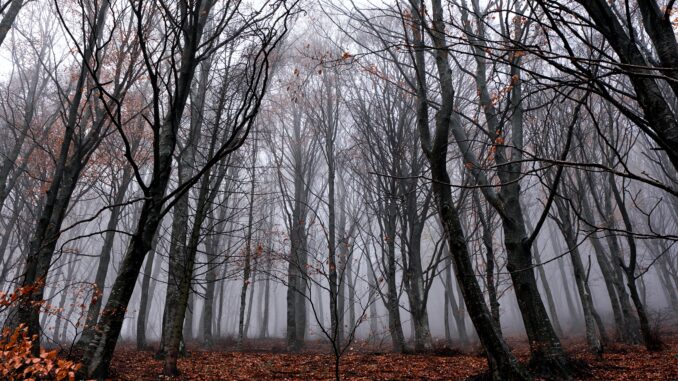
Today marks the publication of the second of our top five stories in the 8th annual Voorheesville Short Story Contest, Rachel Pahl’s “Wild.” The theme of this year’s contest was “The Night Before,” and Rachel’s werewolf story approaches this by asking the question of what makes someone a monster, and what makes someone human? We hope you enjoy it!
The girl wakes up in a clearing by a brook and oh-so-suddenly remembers who she is.
First, her name: Esha. That, at least, has not changed in the night. Then, her body: small and lithe and sinewy and, by all accounts, still growing. A body which has decidedly changed, though it doesn’t quite feel like it yet.
She lays there, in the short patchy grass, for a long time after waking. The sun drips through the canopy of trees and warms her skin so much that she starts to get a headache, so she rolls over, the sun sloughing in waves over her back instead. The movement does little to relieve the heat, but as dappled light runs in rivulets down her temples she feels things start to come back – memories. Overlapping snatches of the night before:
Are you sure? A monster is talking to her.
I am sure. She is convincing the monster.
I am not.
I understand. She is soothing the monster. Against her better judgement.
I can’t help what happens later.
I’m not asking you to.
Please listen to me. I wish someone had told me these things. The monster is afraid.
People have been telling me these things. For twenty-two years. Esha is not.
Esha closes her eyes against an onslaught of pain in her right shoulder that travels in lightning strikes down her arm and into each of her fingers. She shakes the limb roughly – but no, it’s gone numb. On her shoulder, just above the collarbone, the bite mark smarts under her tunic. The wound, she can tell, has closed faster than she expected, surprising for something not twelve hours old. The memory will take time to knit itself into shape in the quilt of her mind, but she has time. She has nothing but time. She breathes, and tastes the dirt by her face.
From the underbrush on the other side of the clearing comes a rustling sound, and the monster emerges.
She looks less like a monster in the daylight, and Esha would know – because she lives with monsters, lived with monsters, and might have become one had enough time passed. Esha is a different sort of monster now, the fault of that monster before her. A sheepish-looking monster, who hugs her arms across her chest and averts her eyes from Esha’s form.
The monster – she did not give a name last night – wears a dark fur cloak pulled over dirty clothes. She has no shoes, and her feet seem too big for them anyway. Her whole body is larger than herself, gangly arms and legs at odds with her quiet, rough voice; bone being scraped over gravel, is what Esha first thought when she heard it. The monster is nothing like she had been described, but Esha wasn’t surprised to learn this, since nothing that was ever described to her has turned out the way it sounded.
The monster approaches on tender, loping feet. “How does it feel?” She kneels to touch Esha’s wound, her finger pressing in a way that isn’t quite gentle. Esha lifts herself up, which stretches the wound in a way that’s almost pleasant. Like moving a muscle after a long time of being still. She raises her arms above her head.
“Sore,” she answers finally, once the monster has had her fill of looking embarrassed. “I expect it might be for a while.”
“The rest of you will hurt, too. Especially after the change.” The monster absentmindedly rubs a spot on her elbow, massaging a stain of dirt deeper into her skin.
Esha smirks. “I can handle that.” It amuses her to tease the monster when she knows the monster doesn’t know what to do with her. Already a dynamic has slipped into place between them; it had from the first moment Esha met the monster’s eyes through the trees. That wolf form, so imposing, had turned soft and quizzical almost immediately. Esha had known she had chosen the right monster, the right method of escape.
She stands and tests her legs, which feel the same, though her balance wobbles. Things in this grove appear sharper than they did the night before – the air, too, is clearer, with a heavier scent. Tree bark and ripe grass and something animal. The monster does not seem to mind this – then again, the monster is used to it.
Esha brushes dirt from her clothes, but the stains do not separate from the cloth. It’s no matter. She won’t need the clothes much anyway. No critters or ferns will care about presentability, and aside from the monster, that is the only company Esha plans on keeping. She plants her feet solidly in the dirt, as if ready to run. The monster eyes her warily. “Well?” Esha asks finally.
“…Well, what?”
“Where are we going?” Esha scans the clearing for a discernable path. She wonders where the monster will go – where she might be taken – whether or not it will be pretty there, perhaps a dark abandoned cabin or a waterfall crashing in a hidden glade. Somewhere her own monsters will not be able to creep, a wilderness where she can lose her own name. Not that she wants to – quite yet. A desire that primal might take some time.
The monster glances around in abject curiosity. “Will we go together?” She speaks with all the grace of a person not very used to speaking.
Esha rolls her shoulder, feeling the skin around the wound stretch. The morning loses some of its sheen with the look in the monster’s eyes: reality knocking at their door. “I suppose I thought we would.” She had thought. Thought most of it out, but not this part. Not the morning after.
A memory washes in like the tide and sticks to the underside of her tongue. Darkness, and the monster:
You know what I am?
I know.
And you know how I became this?
What did you think I was asking for?
The wolf is not an easy creature to handle. It consumes you.
I’d like to be consumed. I think it might be fun.
It’s not a jaunt, liebling.
I’m not calling it one. Don’t call me child.
I apologize. I hated it when people did that to me.
So you do understand.
The monster is now standing, now beckoning for Esha to follow her. “We’ll return.”
“To where?” The clearing is of no particular value, but if the monster means return to the village, Esha will surely run off and never look back. She was looking to escape that wretched place.
“To everywhere, eventually.” The monster offers a wry smile. “But in time. Today, we will return to a home.”
“Your home?” Annoyance prickles Esha’s skin. She didn’t expect to be asking so many questions. The monster inclines her head.
“You could call it that. If we make it there, I will be able to lead you in other directions. From there, you can run.”
Delightful. Esha itches to run, feels it in her very bones, an urge to change and shift and feel herself elongate, let a current of adrenaline carry her forth on four legs, crashing through the trees like a wild thing borne of the dirt and moss. She wonders what it will feel like. With her shoulder – feeling better by the second – she nudges the monster in the arm. “But we won’t run now.”
“No.”
“No?”
“Uh-uh.”
“Why? Wait, why?” The monster smiles; she seems to take pleasure in this needling, the same way Esha finds pleasure in teasing her. Blood heats Esha’s face and it’s odd, because she can’t remember blushing much before.
“I want to talk,” the monster says simply. She holds a branch out of the way so Esha can duck beneath. “That is why.”
The monster takes two long strides and uses her forearms to launch herself over the trunk of a fallen tree that is blocking their way. When Esha follows behind – less gracefully, but with an athleticism that surprises her, that burns justification in her blood – she sees the monster paces away, leaping nimbly across the rocks in the creek.
The monster says she wants to talk, but the monster keeps far ahead of Esha for an hour or more. She performs feats of acrobatics that Esha can only attempt, a practiced ease to the way she moves that feels impossible to emulate. Esha tries. Her muscles will only improve, her body only respond, if she digs harder with her heels and wills it. In between bouts of huffing and the forest-silence that is never silent, Esha feels memory lick at her spine.
If you get what you are looking for, you will have to want all of it.
I want it. I want it ardently.
Some of it is terrible. Some of it will make you scream.
I’ve killed rabbits before. I’ve dreamt of strangling men with my bare hands.
It isn’t the same as your dreams.
The monster finally comes to rest at the peak of a hill, where the trees have cleared away for a moment. She allows Esha to come beside her, close enough to feel the intense heat that radiates off her body. “Below,” the monster says, indicating, “is a village. In it are people.” She gives Esha a stern look, a warning. “We don’t bite the people.”
“Unless they ask nicely.” Esha contemplates. “Was I your first?”
“You were,” the monster acknowledges after a long moment. “The one who turned me was a man. I expect many of them are.” Esha only hums.
Her picture of man, when the monster says it, is one who takes advantage. She can picture that wolf, tall and proud, back arched in a perpetual pounce. His eyes glow yellow and he paws at the dirt, marking his territory with untamed ferocity. There are no others in the picture. He is the only one. Perhaps the only one there is.
The monster turns east and continues, but she does not increase her speed, and she allows Esha to walk with her, their hands so close as to almost be touching. Once they have descended the steep hill and returned to even ground, the monster speaks: “Would it be rude to ask why?”
Esha ignores the first part of the question. As far as she is concerned, there is no rude. She doesn’t know the meaning of the word. “Why what?”
“Why have you made this choice?”
Esha frowns, but she realizes that it looks more like a smirk. “I had one?”
“You did.” The monster places undue emphasis; Esha chooses not to say anything. “And I am curious why you chose this.”
“I want to run. I think becoming a wolf will feel nice, why else?”
“That is not the only reason.”
“How do you know?”
“I have tasted your blood,” the monster says wryly, “and spit out your skin. There’s a certain level of intimacy that comes with that.”
It is not the first time Esha has noticed the way she speaks. It is not brash or wild. It is careful and particular words, and it feels like the gentry her father hobnobbed with, and it makes her wonder.
“I wanted to go wild,” Esha clarifies. “One might call it an escape.”
“One might,” the monster concedes after some time, and that seems like it might be the end of that.
But the monster is new to Esha and her proclivities. A waterfall of truth rains from Esha’s throat only moments later.
“I had reasons, but it didn’t seem like anyone else understood them. And they all came from the same source, the same grudge, I suppose – there is a story that I have been told, in one form or another, since I was very small. It is a story about a young girl, who is in the woods for one reason or another, when she happens upon a wolf.” The monster bristles. “The wolf hurts her, kills her, what have you, and the girl is gone. And from the first I never liked it. I became tired very quickly of all these girls disappearing, one by one, into marriage or work or childbirth or death. And these are the only stories they heard. These were the only characters they believed in. Girls who died, and the wolves who killed them.”
“Wolves,” the monster echoes. Esha keeps an eye trained on the side of her face. She waits for a reaction, she waits for approval. The monster only says, “So why, then?”
“I didn’t want to die,” Esha explained. “There were two characters, and I didn’t want to be the one who died.”
“There are other characters in other stories,” the monster offers, and Esha knows she is thinking of some. Stories of bloodsuckers, seers, fey and fishpeople and predators of the jungle. Stories that never leave the town they were written in, passed down from one family to the next, of a curse or a blessing. Sometimes there are even stories about love. Esha knows the monster is thinking these things, and finds herself blushing again.
“I wanted to be the wolf,” she answers simply. It is easier than saying I wanted to subvert expectations. Easier than I wanted to be understood and Sometimes I just feel like running wild.
The monster allows herself a single glance at Esha’s face, which is passive; but behind her eyes, a tempest roils. The monster recognizes this face – and more than that, she is fond of it. She finds herself saying, before she realizes it: “I did not feel like a wolf when I was first turned. I feel like one now.”
“I’ve felt like a wolf my whole life,” Esha says.
The monster does not reply, but Esha senses a question there, lingering on her tongue. The monster wants to push. She won’t; she’s polite. Where, Esha wonders, did she learn this practiced silence?
They walk for hours, or days, or years. Esha knows, though, from the position of the sun in the sky, that it has only crested into evening on the first day; the landscape has turned into an endless scroll of greenery and time seems to take forever when the monster walks alongside her. Their legs feel wrong to both of them. Their bodies ache for something else, but still they walk, bipedal, just in case either of them feels like speaking, saying something else.
Neither of them say anything else.
When night well and truly falls, the monster shows Esha – almost without words – the way to catch a field mouse, to trap it in her hands and snap its neck with quick reflexes. They eat the mice raw. An hour ago, Esha had contemplated dinner in anticipation, had not been sure what to expect. The mice are still warm, and she feels only fullness as she cleans her face of blood. Guilt appears a useless emotion. The monster approaches the meal unfazed.
An arm’s length from the monster on the hard-packed dirt, the moon chilling Esha’s bare feet as if it is made of ice, she spares a thought to the question: what felt so magical about the night before?
Was it the darkness? That illicit absence of light, where things happen that aren’t spoken of in polite company? Where stories are told, where people are made? Could it have been the cottage, not so far away that the candlelight in the windows couldn’t be seen through the trees – the idea of all of her family watching as a monster bit into her skin and set her free?
Perhaps it was the monster herself, lanky and understated and shy, asking permission before sinking her teeth into Esha’s neck, a change on her tongue that laved, so politely, at the drops of blood which scattered across her skin in the moonlight. A monster who was kind.
Esha rolls onto her side so she can see the monster, curled in a fetal position, hands twitching as she dreams. Her messy hair, long and tangled, drifts into her face, is blown away again by her even breath. The dirt smudge across her cheek has been rubbed away and replaced by fresher mud.
It doesn’t feel right to call her monster anymore.
But she doesn’t have any other name.
In the morning, the monster wakes first, though Esha rises earlier than she used to, shaking her limbs to rid them of sleep. Her joints protest, calling for a relief she cannot yet give. Not until the monster shows her how.
“Could we change today?” Esha asks as she twists her neck, cricked uncomfortably from sleeping on the ground. Her body aches and her limbs don’t feel her own.
The monster frowns, looks apologetic, but shakes her head. “I promise you, the change will only make it worse. We’re not that far. Come on, I’ll hold you up if I have to.”
The offer seems genuine. Esha denies it, but remembers it all the same. From that night:
I can’t give you anything. I mean, I can only give you this. The bite.
That’s all I ask.
All you ask.
Is it uncommon to ask?
Somewhere between uncommon and unheard of.
The forest evens out into trees aligned almost parallel with one another. A dirt path, clearly well-traveled, stretches out ahead of them. The day feels as if it will be long.
The monster says, “I had planned, at first, to leave you to sleep, and I would run.”
“You were there when I woke up.” Esha is not sure whether she feels understood or left behind.
“I didn’t think I was going to be.” The monster shrugs. Her face betrays tightness, pretending to be casual. “I spent all night by the stream, and when the sun rose, I found myself going back to you.”
“Out of responsibility.” Esha snorts.
“No,” the monster says. “I believe it’s because I cared.”
It is a simple statement, and it makes the wound on Esha’s shoulder – now almost completely healed – throb in time with her heart. Care is a human emotion. Esha has not typically known monsters who care.
The monster turns them off the path and pushes aside some hanging moss and vines. Before them, Esha sees a cave, set into the cliff face beside their path. The escarpment rises above them, tall and stoic, but Esha can tell from the neat little patches of wildflowers that this place is a home.
The monster follows behind as Esha makes her way inside. The dark interior is chill, slightly damp, like the forest right after it rains. The monster picks up a stray rock from the ground and strikes it against something, and suddenly there is light, dim, from a single candle.
They stand in the center of a cave, a lonely structure made a home by someone’s gentle hands. Straw pillows and fur blankets, some knotted with gunk and mold, are piled in a corner like a makeshift bed. A fire pit in the center of the cave is blackened with old ash that hasn’t been cleaned out, piled neatly so as not to leave a mess. On shelves carved out of felled, rotting wood, human possessions are littered. A small stack of books here, a child’s doll there. Scavenged things. Forgotten, dirty things, shined up as best they can be by spit and creek water.
And on the walls, there are paintings.
Paintings, in vibrant color. Mountains, and trees, and small figures, barely more than sticks. Portraits. A life’s worth of images distilled into primary colors on wet stone, some of which have dripped away, weathered by the elements. It doesn’t remind Esha of the great artists she has known and studied. It reminds Esha of a young girl’s imagination.
When Esha turns to the monster, she finds she has pulled into herself, cringing from view.
“I didn’t have a choice,” she offers by way of explanation, “and this is what I did with the humanity that was left in me.”
“It’s beautiful,” is Esha’s frank acknowledgement. She feels like she’s telling the truth.
“The paintings?”
“No,” Esha says, but doesn’t clarify. She knows the monster understands her. “So you were one of those girls. Like the ones in the stories.”
“I was.” The monster sits on the ground, in the dust and the dirt. “And for a long time, I was both wolf and girl, trying to decide which made me feel less… like a monster.” Esha toes at the ground. She feels shame blossom into a blush. “You think you can be both? The wolf, and the girl?”
“I think I already was,” Esha says frankly, “even before you bit me.”
The monster laughs. “You might have been.”
The cave is silent. Outside, Esha thinks, it has started to rain.
“Can you tell me what happens in those stories you were talking about?” The monster asks, once she’s sure Esha is done staring at the walls, memorizing their stubbornly human art. “The way I heard… the way I remember… they never really ended.”
“Sometimes they don’t,” Esha agrees. “Sometimes they do. I think the real ending is somewhere in the middle, actually. When the girl learns.”
“Not to talk to wolves?” The monster’s eyes shine with mirth, barely concealed affection. Esha rolls her eyes.
“The girl only talks to the wolf because she thinks she loves them,” Esha says. “Every so often, it’s the right decision.” The monster grins.
“Let’s run.”
Esha and a monster – no, two monsters – no. Two girls.
Two girls run through the woods, feeling the breeze in their fur, in love with each other, in love with the wilds. They are the only characters in this story.



